Ida B. Wells didn’t let opposition stop her mission
Podcast: Embed
Subscribe: RSS
Podcast: Embed
Subscribe: RSS
Video Courtesy of CBN – The Christian Broadcasting Network
Recently, a co-worker shared something that enlightened me. They always used a financial counselor to advise them on various decisions that they needed to make regarding their finances and investments. However, they didn’t seem to be satisfied with the outcome of their investments.
They shared with me that, after talking in detail with their spouse, they decided to learn more about investments and the stock market. They signed up for classes and realized they could actually manage their own financial portfolio. They took charge of their investments and began to see a positive turnaround within the first few months of releasing their financial counselor.
They seemed confident about what they had learned and we’re looking forward to managing their financial portfolio in the months and years to come.
The biggest fear that many people have, is the fear of not knowing what you don’t know. That sounds odd but it is true. What you do not know about your finances, or financial health, may seem scary to some to the point of denying its existence or choosing to deal with it when things get really tough.
God desires for us to have balance in everything we do. Having the confidence to handle your finances is a commitment you have to make to yourself. Hosea 4:6 states “My people are destroyed for a lack of knowledge” KJV.
If people are bold enough to admit they do not know, they take the time to educate themselves in the areas that matter to them. So, why not us, children of the faith?
There are so many resources on finances. The question you need to ask yourself is, “What is my area of struggle when dealing with money?”
When it comes to money, you have to be bold and face the issues head on. If you are tremendously blessed financially and have no issues with money, find ways to educate others to live in that liberty that you have been blessed to experience.
I learned a great lesson from that co-worker. What you don’t know, you can learn, and what you learn can enlighten you to make better and sound decisions that can position you financially to be in a stable place.
Are you ready to face what you don’t know about your finances? Start today. Learn something. It could serve as the trigger of change to a great financial future for you in the years to come.
Podcast: Embed
Subscribe: RSS

Embarking on the entrepreneurship journey can be a thrilling adventure reminiscent of a roller-coaster ride, with its exhilarating highs, daunting lows, and unexpected twists and turns. While the daily grind of being an actual CEO can be enjoyable, achieving success can sometimes feel like an obstacle course, leading us to question if entrepreneurship is indeed the right path for us.
Obstacles are inevitable in the world of entrepreneurship. However, you can overcome these challenges and achieve your goals with the right mindset and approach. Three essential tips can help you navigate obstacles as a faith-based CEO.
As a faith-based CEO, prayer is a powerful tool to help you overcome obstacles. Keeping God first and at the center of your business decisions is essential. This means taking the time to pray and seek God’s guidance before making any significant decisions.
When you face obstacles, it is essential to trust God even when you cannot track Him. Remember that God’s ways are not ours. Sometimes, His plans for us may not be evident initially. However, with faith and patience, we can trust that God will work all things together for our good.
Prayer is also a great way to stay grounded and focused on what is truly important. When we spend time in prayer, we can be reminded of our purpose and mission, which can help us stay motivated and focused during challenging times.

As a faith-based CEO, it is essential to understand that growth and success take time. It is easy to get discouraged when things take longer than we want them to. However, being patient and allowing yourself time to grow and develop is essential.
Remember that obstacles are not necessarily roadblocks; they can be opportunities for growth and learning. Instead of becoming frustrated when things do not go as planned, try to see obstacles as opportunities to learn and improve.
It is also essential to be patient with others. As a leader, you may be working with people who need to be on the same page or need more time to understand your vision. Take the time to communicate clearly and be patient with them as they learn and grow alongside you.
While being patient with others is essential, it’s also easy to fall into the trap of self-criticism and harsh judgment. However, as a faith-based CEO, it’s crucial to remember to give yourself grace in the process. Building a successful business takes time, effort, and patience, and it’s essential to acknowledge that there will be setbacks and mistakes along the way. Giving yourself grace allows you to learn and grow from these experiences without being weighed down by self-doubt and negativity.
Furthermore, as a mompreneur or anyone balancing multiple responsibilities, it’s essential to recognize that taking breaks and prioritizing self-care is okay. Burnout and exhaustion can easily lead to a lack of focus and productivity, making it vital to take the necessary steps to recharge and refocus. Giving yourself grace and prioritizing self-care creates a space to thrive as an entrepreneur and achieve your goals without sacrificing your well-being.

As a CEO guided by faith, developing a mindset that is comfortable with starting over is crucial. Failure is an inevitable part of the entrepreneurial journey, and it is vital to have the ability to pivot and adapt your plans when God is leading you toward new paths. Ignoring signs of new direction can hinder your progress, making it essential to remain open to God’s guidance and ready to make necessary changes.
It is easy to become attached to a particular idea or plan, but sometimes, letting go and trying something new is necessary. Learning to pivot can help you overcome obstacles and find new opportunities for growth and success.
When you face obstacles, take the time to reflect on what went wrong and what you can do differently. Use this information to adjust your plans and try something new. Remember that success is not about avoiding failure but learning from it and using it to improve.
It’s crucial to remain innovative and adaptable in the face of challenges. Returning to the drawing board and reevaluating your strategies can be an excellent opportunity for growth and development. By reflecting on your business’s strengths and weaknesses, you can identify areas for improvement and implement new ideas and approaches. It’s essential to remain open-minded and willing to try new things, even if it means stepping outside your comfort zone.
Being innovative allows, you stay ahead of the competition and keep your business relevant and up to date. Additionally, remaining innovative and flexible shows a willingness to learn and grow, demonstrating a solid commitment to success as a faith-based CEO.
Overcoming obstacles as a faith-based CEO requires a combination of prayer, patience, and pivoting. You can navigate obstacles and achieve your goals by keeping God at the center of your business decisions, being patient with others, and learning to shift when things do not go as planned. Remember that obstacles are not roadblocks but opportunities for growth and learning. With faith and perseverance, you can overcome any obstacle that comes your way.
—-
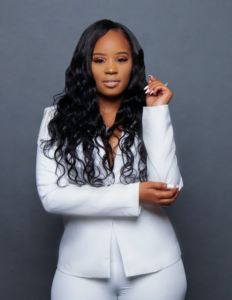 Marquitta DaShae’ Johnson is a transformational leader, speaker, and author who helps faith-driven moms launch high-ticket coaching businesses in 90 days minus burnout. With her Mom To Millionaire model framework and Mommies Making Millions brand, Marquitta empowers mompreneurs to achieve their goals while managing self-care, motherhood, and business. Her mission is to inspire and empower moms globally in the areas of motherhood, mindset, and millions.
Marquitta DaShae’ Johnson is a transformational leader, speaker, and author who helps faith-driven moms launch high-ticket coaching businesses in 90 days minus burnout. With her Mom To Millionaire model framework and Mommies Making Millions brand, Marquitta empowers mompreneurs to achieve their goals while managing self-care, motherhood, and business. Her mission is to inspire and empower moms globally in the areas of motherhood, mindset, and millions.
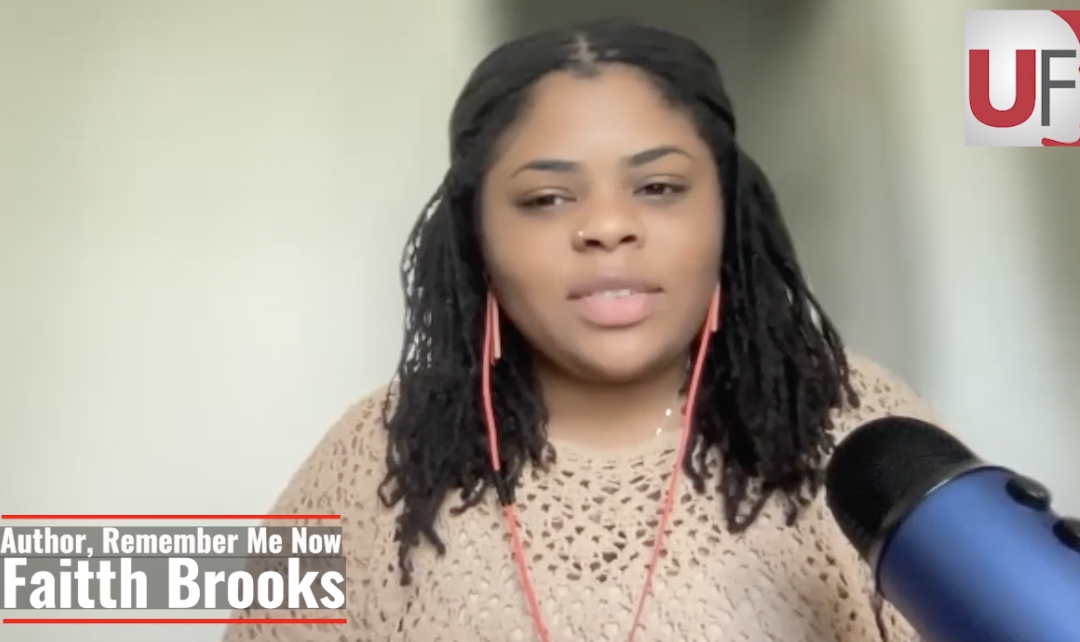
Faitth Brooks believes that Black women’s lives, voices, and journeys need to matter now. Trevor Noah said in his final monologue as a host of The Daily Show that his final thought as host of one of the most recognizable shows in the country is to listen to black women. We need to remember black women now more than ever.
In 2020 at the height of the pandemic there was a national push to support the movement for black lives in the United States of America. After years of challenges, rejection, confrontation and dismissal people from high powered CEOs to rural school teachers wanted to support Black Lives Matter. Combining with the #metoo movement there was a push to talk about the senseless killings of Black women. The country suddenly wanted to remember black women’s lives mattered after Breonna Taylor’s life was taken.
Faitth Brooks was doing antiracist and women’s flourishing work in the aftermath. And after years of reflecting she came to a truth, we need to remember black women now, not only when they have been killed. She tells her story and creates space for other black women to be uplifted in her new book Remember Me Now: A Journey Back to Myself and a Love Letter to Black Women. UrbanFaith sat down with Faitth to talk about her journey, her new book, and her thoughts on how we can join in remembering black women now. More about the book is below, the full interview is above.
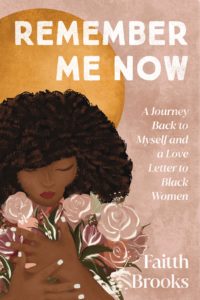
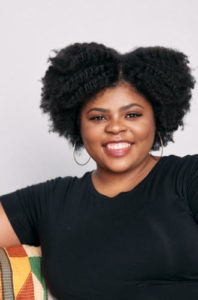
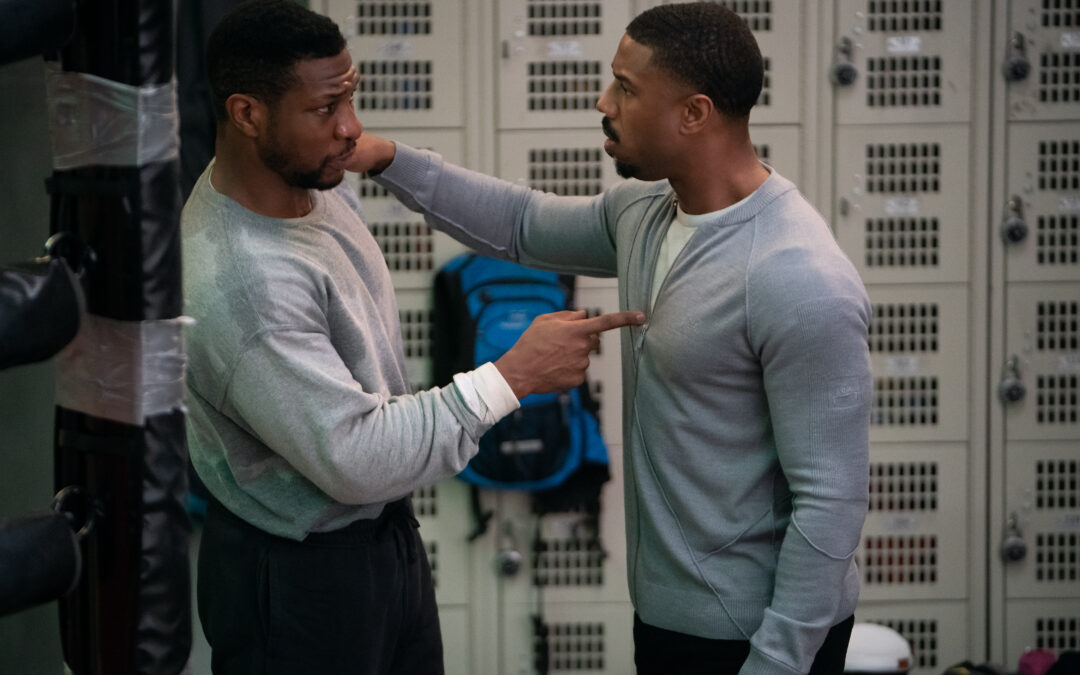
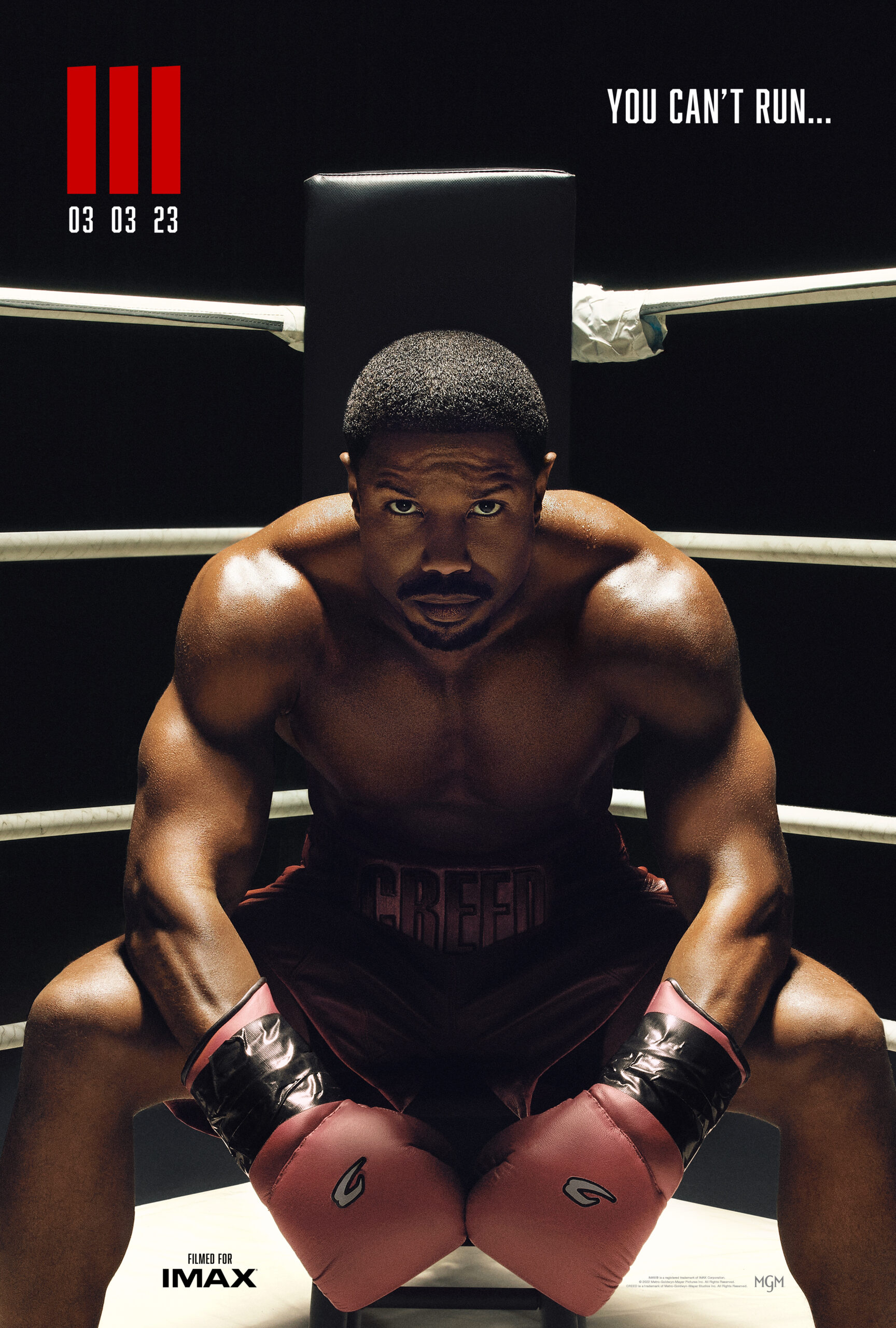
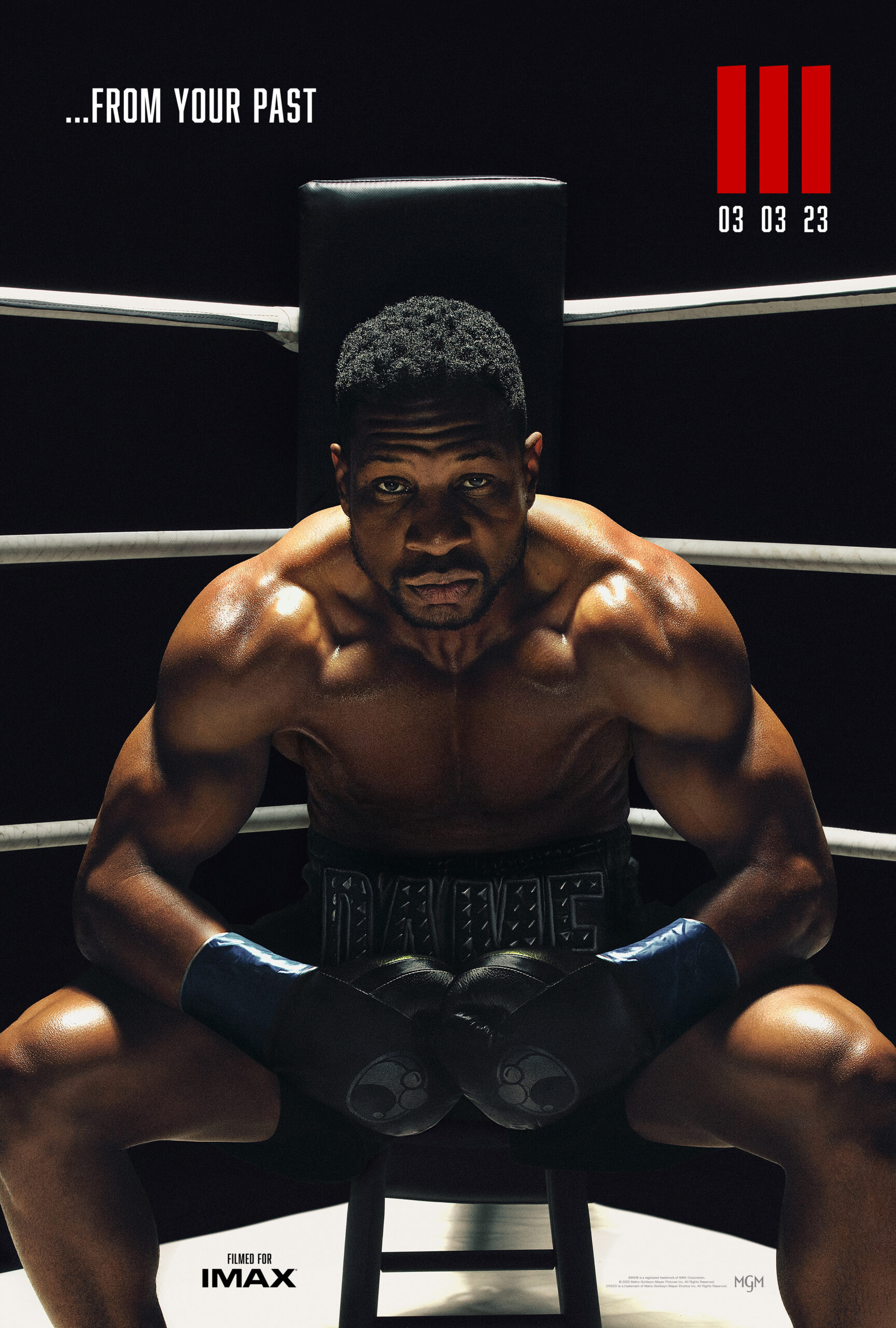
The following is an edited excerpt for clarity, the full audio interview is above.
Allen
I’m Allen Reynolds, the editor of UrbanFaith. I had the opportunity to interview Michael B. Jordan and Jonathan Majors about their new movie Creed III, in theaters everywhere, March 3.
One of the things I thought Creed III did so well was to give space and allow for complexity in emotion and aspiration for black people, but especially for black men. Why was it important for you guys to show joy, loss, sorrow, pride, and you were able to capture so much of that. Why was that important?
Michael B. Jordan
I think because the narrative has often been one note for a long time. Through cinema on a project like this that’s going to get so many eyes, so many different points of view, to show those layers and complexities that is us. That is black men, men in general, but specifically our stories. We wanted to give it the respect and the honesty because we all know a Damian, we all know an Adonis, at some point at some level. And being able to represent those stories in a truthful way was really important to see.
Allen
Another thing that stuck out to me as well was that you have all these different relationships, you have mentor mentee, friendships, black marriage, fatherhood, being a child with an aging parent, and of course rivalry, all of that is so much a part of our story. What was it like to inhabit all those different roles?
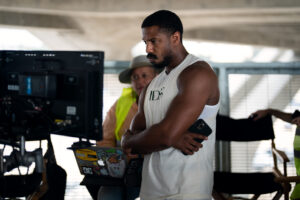
Director Michael B. Jordan on the set of his film
CREED III
A Metro Goldwyn Mayer Pictures film
Photo credit: Ser Baffo
© 2023 Metro-Goldwyn-Mayer Pictures Inc. All Rights Reserved
CREED is a trademark of Metro-Goldwyn-Mayer Studios Inc. All Rights Reserved.
Michael B. Jordan
Felt freeing. Honestly, for me, as a filmmaker, now a real storyteller, in a real way, being able to talk about and show the things that I’ve experienced that affect me in my life. Other people [and myself] have those type of relationships. Also, I think it felt it felt great to do work, I felt completely honest, real, and grounded. We do projects, different movies for different reasons. And all of it may not feel personal, [but] you try to bring a little bit of yourself to these roles. Feels good. It felt good.
Jonathan Majors
I think my mission was a lot different. It’s really a commentary on brotherhood. What [does brotherhood] look like to you? At one point, [Creed] is my best friend, my homeboy, my ally. One point he’s my nemesis. One point, he’s my motivation. The man to that one relationship. We’re gonna continue the relationship between them and beyond as the primary attachment. My mission and my objective was to show the complexity of that relationship. In this one partnership, there’s all these different facets. It’s not just best friend. Sometimes a student- teacher, sometimes it’s beggar-rich man, sometimes it’s prisoner and freemen. There is a slave [and] master within the brotherhood. [Damien] was a coyote, [Creed] was purebred puppy. We were both dogs. Both men were both gladiators were both fighters, but there are these differences. It was difficult to establish those relationships.
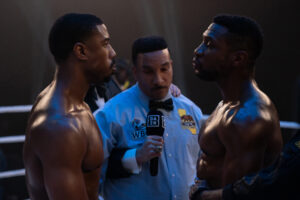
Michael B. Jordan stars as Adonis Creed and Jonathan Majors as Damian Anderson in CREED III
A Metro Goldwyn Mayer Pictures film
Photo credit: Eli Ade
© 2023 Metro-Goldwyn-Mayer Pictures Inc.
CREED is a trademark of Metro-Goldwyn-Mayer Studios Inc. All Rights Reserved.
Allen
I think that you guys left so much room, just to see a movie like this with a majority black cast. Black director, I think you’re carrying on legacy of Oscar Micheaux, Spike Lee, of these black directors, right. And you carrying on for these black actors, the Sidney Poitier, Denzel Washington, Phylicia Rashad was in this movie. I mean, it’s incredible. What is it like for you all to be carrying on the legacy of black art and black film from actors’ and directors’ perspective now?
Michael B. Jordan
It feels good. It feels like we’re honoring their path and the race that they’ve been running. It’s our responsibility as filmmakers in the platform that we have and opportunities that we’re given because of their hard work to continue that work, that study, those ideas. Without Sydney, Denzel, and Harry Belafonte and in all the work that they’ve been doing, and have done, we couldn’t have been given this opportunity to run the way we are. We’re just trying to get every drop of juice out of the lemon, say as much as we can, be truthful and honest. And working with Phylicia, is fantastic. Amazing. Yes, ma’am. Anything you want ma’am. (laughs) Just honoring that it’s surreal sometimes, honestly, for me, it kind of it feels larger than life. You know, I have not really been a guy to stop and like smell flowers often. I’m like, what’s next? But when I hear somebody say that and break it down that way, it just kind of hits me like, wow, okay!
Jonathan Majors
For me, it’s all the aforementioned artists Mike named but also Ella Fitzgerald, and Muhammad Ali, and Sam Cooke [whose legacies] we accepted. I know Mike is about to get on that Walk of Fame.
What we are talking about, it means something because he is going to transcend whatever an actor is, and transcend whatever are director is, you’re a part of popular culture. And that may be a bad word, but popular culture is the culture. When you begin to move at that level, you begin to do what Mike has done and is doing, you join the pantheon of these legends. Not only do we feel motivated to continue it, but to grow it. I mean, respectfully, we know things that Denzel, Sydney, and Harry were learning, we grew up knowing those things. It is our job to push it forward. You know, I think what is happening now is there’s a clear establishment of the new Vanguard. And that’s us. Whether or not we want it, it’s us, and [we have a responsibility.] We have athletes joined us in the fray, but it’s about moving the entire culture forward. You know a huge part of pop culture is black culture. The more we mature, the more sophisticated we become, the more intelligent conversations, the more in-depth conversations become, the more complex they becomes, the more we are adding to our culture and the richness of our culture, but also moving everything forward.
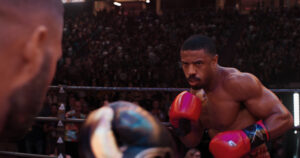
Michael B. Jordan stars as Adonis Creed in
CREED III
A Metro Goldwyn Mayer Pictures film
Photo credit: Courtesy of Metro-Goldwyn-Mayer Pictures Inc.
© 2023 Metro-Goldwyn-Mayer Pictures Inc. All Rights Reserved.
CREED is a trademark of Metro-Goldwyn-Mayer Studios Inc. All Rights Reserved.
Allen
Just pulling back a little bit. You all have both just succeeded so much are two of the greatest black actors in this moment, some of the greatest actors of our generation, if I may say so. And I know that a huge part of that has been growth, and my audience is interested in faith. I know that’s been huge, especially in Jonathan’s journey. Can you talk a little bit about what faith has meant to you all as artists, and even as you continue to climb these ladders and open new pathways?
Michael B. Jordan
Faith, you know, for me is strong. I think we’re in an industry where, you got to have a lot [of faith]. You’re one of many, [who will face] a lot of no’s, a lot of rejection, a lot of obstacles that are in your way, in order for you to see a vision of what success looks like to you. You got to have faith in yourself, you have faith in something bigger than you. I think meditation, spirituality, for me, silence [are impactful]. And then that brings those thoughts that are [helpful] that comes to you. I think it’s extremely important. And also faith in evolving things. I think there’s a way in this industry… a lot of roadblocks that can get in your way and that represent life. As you travel life has a lot of different roadblocks that would come in your way and being the main character of your own movie, as being the hero of your own story, got to have that faith in order to kind of achieve it, reach the mountaintop, so to speak. So that’s something that sticks with me. We have strong faith.
Jonathan Majors
To me [faith] means everything. I know it’s a scary word [in some circles] but I pray all the time. You know this tiny, small little voice, that’s [what has] always guided me. And the building of faith, you know, stepping out on faith. I mean, this whole thing set me off. I hadn’t read the script. This idea of discernment. Michael, and I spoke about that [discernment], that’s what was happening in those 30 minutes [when I was offered the role of Damien]. There’s a Hollywood version where I go, “oh, nice” and I just knew. But I was told. [Or I wouldn’t have done it]. I’ve met Michael’s mother, you know. These are praying, folks. We’ve all been prayed [over] our entire lives and the building of the faith, even having this conversation with you right now. Being asked about [faith], it’s probably a good time, as we both are both tired. I’m not gonna preach. But I have no doubt where my strength comes from.
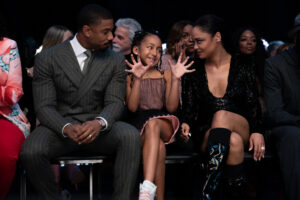
(l-r.) Michael B. Jordan stars as Adonis Creed, Mila Kent as Amara and Tessa Thompson as Bianca in
CREED III
A Metro Goldwyn Mayer Pictures film
Photo credit: Eli Ade
© 2023 Metro-Goldwyn-Mayer Pictures Inc. All Rights Reserved
CREED is a trademark of Metro-Goldwyn-Mayer Studios Inc. All Rights Reserved.
Allen
I appreciate that. Last question for you all. Our audience is young people, young adults, I work with high school actors. What advice would you give to those young folks, young artists who are trying to be successful trying to find their voice. What advice would you give to the next generation?
Michael B. Jordan
Be relentless. I always say be relentless. Find something you care about, that you obsess over, and just go for it. There’s going to be a lot of noise, a lot of resistance. But try not to be distracted by a lot of distractions. [They’re] all around you in a lot of different forms, by way of that little box right there [your phone]. We’re all guilty in a certain way, shape or form sometimes. But I think for young people who grew up with that as the norm [it’s even worse]. I grew up with dial up modems, printing out directions on mapquest lol. That’s, that’s my generation. But a lot of these kids, [smart phones] that’s their truth, that’s their norm. There’s a lot of distraction nowadays. So just being able to put that thing down for a minute and be to your own thoughts, you know what I’m saying, focus, and have the work ethic and not think everything’s so instant and immediate.
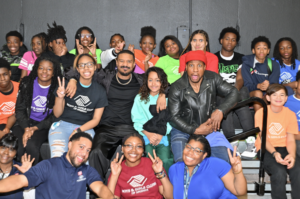
Michael B. Jordan and Jonathan Majors at Boys & Girls Club of Atlanta for Creed III Atlanta Outreach
Because a lot of things they feel like, it’s right now, right now, and it’s not, you know what I’m saying? These are products of years of work, dedication and discipline. And I think, I would always preach it to the next generation, to these young kids, to just find that work ethic, because there’s something true to it. There’s something that nobody can take away from hard work. You put the time in and you can’t they can’t take that away from you. Whether that’s reading, whether it’s mastering the craft, doing your 10,000 hours. That is legit.
Jonathan Majors
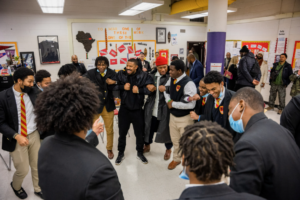
Micahel B. Jordan and Jonathan Majors spend time with students at Urban Prep for Creed III Chicago Outreach
I’m in it now. I would pray for purpose. I would pray for anointing. And once you know what your anointing is, that’s it. A lot of times, we’re just going after the wrong thing. The work ethic, a lot of people think me and Mike just have a dog work ethic. That’s not, not true. But I think something that me and Mike also have in common is that we know what we’re supposed to be doing. We gain a great deal of pleasure from it. It’s our anointing. You hear Michael B. Jordan, it’s not just Michael B. Jordan, something was put in him. Something was put in me, so I have to be aligned with that. When we begin to walk our path, there’s still no’s, there’s still impossibilities… but there’s God. So it’s all good. It’s all good. That’s what I was saying. Then yeah, all the grit and all that…yeah, absolutely. But a lot of times you’re actually just going after the wrong thing. I will say to the young folks, you don’t need your phone yet. Grown ups need phones. We actually have businesses. I don’t use [social media and] stuff like that. But I do understand my colleagues who do. They’re like, in the game, in the matrix, there’s no getting out of it. But for young people, you can keep it so simple. And it can always be simple, unless you complicate it. Suddenly you begin to work through that thing. Then you got to work for it. If you can, if you can abstain for as long as you can. It’ll let you know when you need it. Insta-chat-facebook-tweet. Pay attention a little longer. They won’t last. [Social media we grew up on didn’t last].
View the final movie trailer below